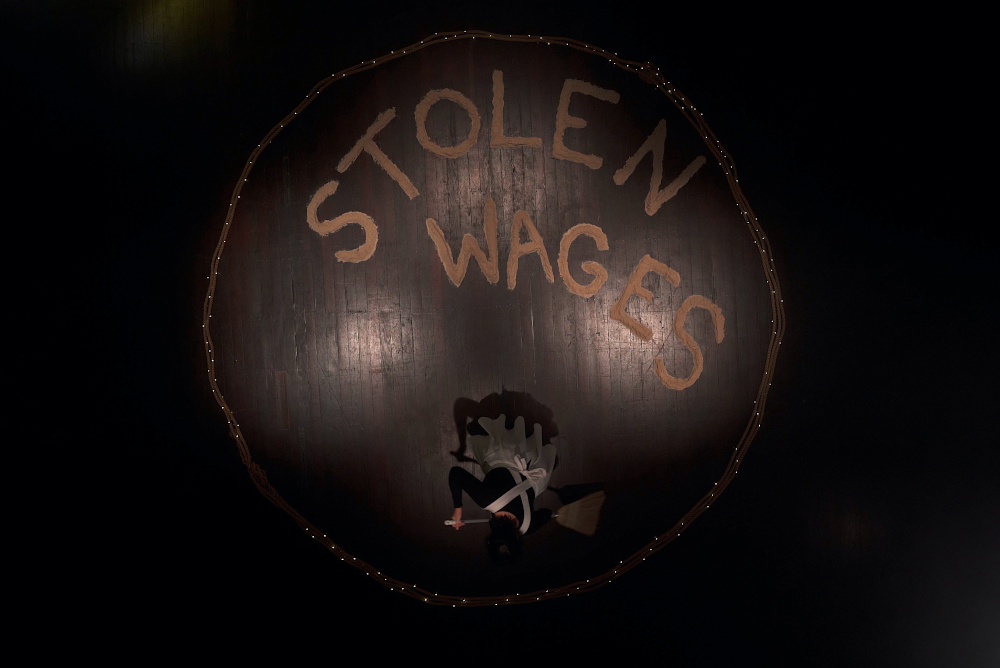Unfinished Business – a State’s denial
I am currently researching Aboriginal women’s domestic service stories and labour histories in South Australia and working with community through Archival-poetic praxis to creatively document memory stories for the future record. The majority of Aboriginal families I know carry intimate histories of domestic service through living memory and intergenerational blood-memory passed on. Despite the significance of these stories in the collective memory of Aboriginal South Australians, government-orchestrated systems of indentured labour remain largely hidden and unacknowledged in the state’s official public narratives of history. As eminent leader and historian Jackie Huggins (in Black et al. 1994: 6) describes ‘the stories of Aboriginal women domestic servants cannot be told enough. They illuminate a deeply rooted racist facet of Australia’s history. They tell of the trials, tribulations and triumphs amidst the backdrop of oppression’.

Stolen Wages, video-still, Unbound Collective, 2021.
In 2019 was invited to present an overview of this research to the South Australian government’s Aboriginal Lands Parliamentary Standing Committee which had identified the issue of Indigenous stolen wages as a matter requiring further investigation. The Committee acknowledged that, while significant progress had been made in other states following the Australian Senate’s 2006 National Stolen Wages Inquiry, this was ‘not yet explored in South Australia’ (Secretary to the Aboriginal Lands Parliamentary Standing Committee, pers. comm. 24 June 2019). The Senate Committee’s final report noted its disappointment that the South Australian government did not participate in the National Inquiry and made specific recommendations: to further consult with the Aboriginal community; to conduct preliminary research in State Record archives; and establish a compensation scheme if evidence is found to the withholding, underpayment or non-payment of wages and welfare entitlements (Commonwealth of Australia (CoA) 2006, xiii–xiv).
The Senate Committee also made specific reference to the significant obstacles in accessing archival records and relevant information (CoA 2006: 85). The current lack of research in South Australia renders it impossible to determine or quantify the extent of unpaid wages, to identify the families impacted, or to consider what a stolen wages reparations scheme might look like.
My short twenty-minute testimony to the Aboriginal Lands Parliamentary Standing Committee was an opportune moment to also shine a small spotlight on the state’s institutions, systems and processes that control archives and feed particular colonial narratives on histories and people; not only the physical record artefacts, but also the political project that drives, contains and maintains them. I provided some context to the burgeoning Aboriginal domestic service workforce in the early twentieth century, such as: the assimilation-based rationale for interdependent policies of child-removal, institutionalisation and training; the labour conditions Aboriginal women were subject to; and the question of payment and the state’s management of trust fund accounts. I referred to existing national literature and research since the 1980s regarding the history and impact of stolen wages practices, and of Aboriginal domestic labour, particularly in Queensland and New South Wales. I especially wanted to acknowledge the work of Indigenous scholars and writers, poets, filmmakers and artists who have been telling these stories for a very long time; stories that are often reluctantly disclosed yet shape our identity and subjectivity to leave an indelible imprint on our future.
Women may have been the boundary markers of empire. But it was the gendered and racialized intimacies of the everyday that women, men, and children were turned into subjects of particular kinds, as domination was routinized and rerouted in intimacies that the state sought to know but could never completely master or work out.
–Ann Stoler 2006: 57.
As a descendant from a long line of Aboriginal women domestic workers, I felt the gravity of bearing witness to those gendered and racialised intimacies of the everyday to which Stoler refers. I decided to present the Committee with the basket of letters which represented a site of shared history that also demonstrates an intense and determined labour of maternal love. These letters were written with persistent and clear intent. Importantly, they expose poignant, deep family bonds and love, and proof that children were not ‘neglected’ or ‘destitute’, as was their legal charge simply for being Aboriginal and poor. In fact, the systemic and orchestrated injustices that have occurred at the hands of the state, such as indentured domestic labour or stolen wages, have significantly contributed to intergenerational poverty and continue to impact Indigenous socioeconomic disadvantage today (Gunstone 2014; Kidd 2007).
As this basket of letters was passed around the Parliament House meeting room, I drew their attention to key words and statements carefully threaded to the outer surface:
‘a domestic’, ‘cooking’, ‘kitchen work’, ‘house work’, ‘identity card’, ‘cleaning’, ‘house maid’, ‘ironing’, ‘mending’, ‘washing’, ‘washing up’, ‘dishes’, ‘waitress’, ‘mother’, ‘my daughter’, ‘my sister’, ‘we would all like to have her home very much’, ‘I am happy to be home’, ‘I would like to meet her’, ‘down hearted’, ‘mother and family’, ‘good girl’, ‘apron’, ‘uniforms’, ‘I am writing’, and ‘helping mother’.
I wanted to impress on this Committee that where local stories are defined solely by and for nation-state interests, the driving imperative for Indigenous people to rewrite the local is that we have ‘the right to write and be read’ (Gunew 2004: 115); to rewrite these narratives of belonging and unbelonging, to speak back and reinscribe voice and agency to our loved ones and country.









